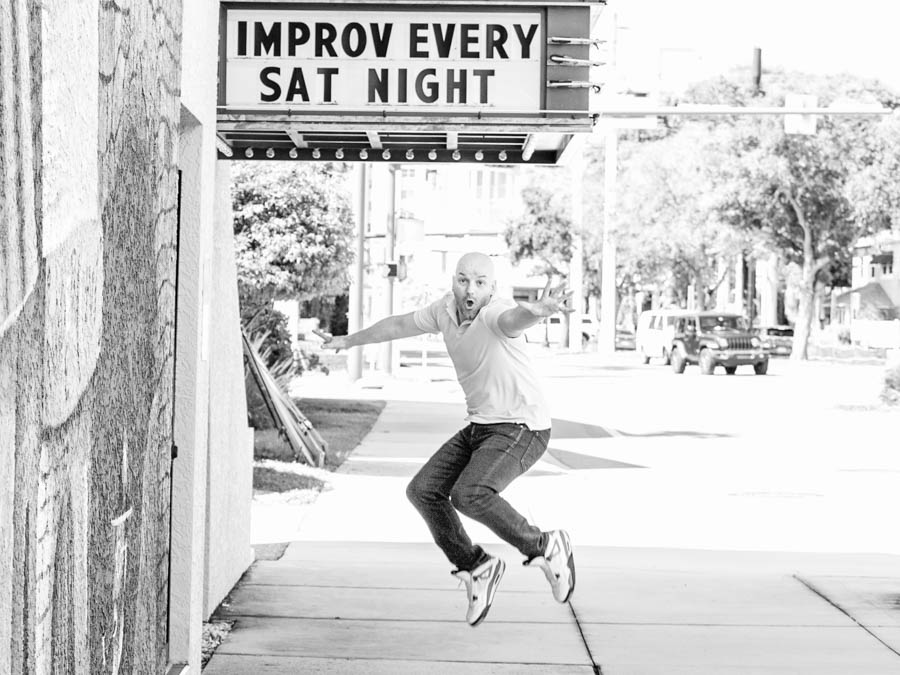It’s 7:29 p.m. on a Saturday night at the corner of First Street and Cocoanut Avenue, and I know two things. Number one: I’m about to perform for the next 90 minutes in front of 120 paying theater patrons and I have no idea what I’ll say or do. Number two: There are seven people— a stage manager, a pianist, and five fellow actors—in the exact same situation, and they all have my back.
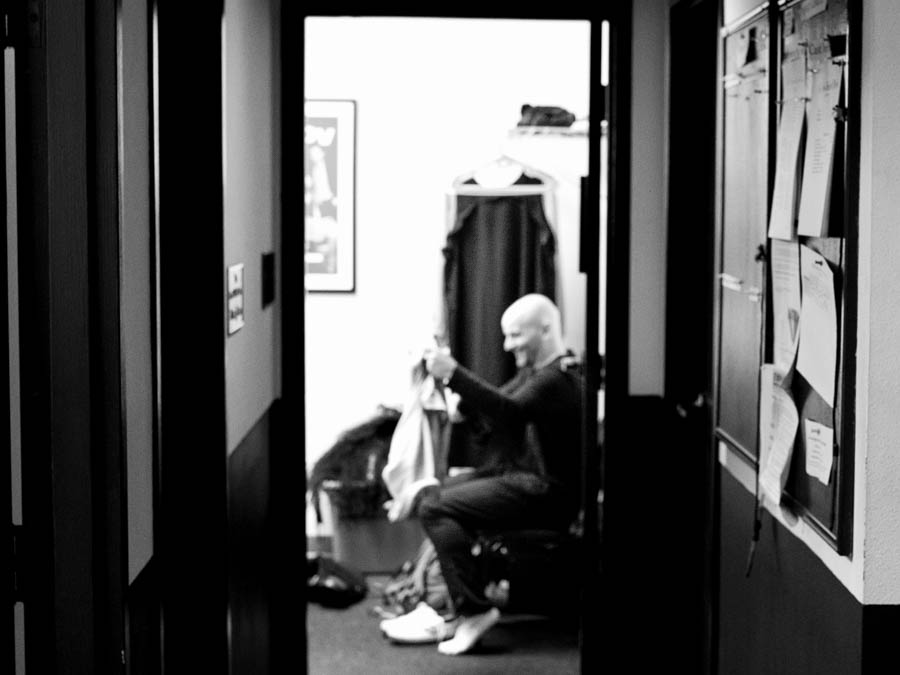
I know this because we’ve all tapped each other on the back shoulder and said, “I’ve got your back,” as we walked from the dressing room to the stage. It’s a tradition you’ll find here and almost everywhere that improv comedy is performed. A moment later, the lights dim, music starts to play, and the show has begun. Florida Studio Theatre (FST) director of improvisation and my friend, Will Luera, takes the stage to welcome the audience. I watch from the wings with the rest of the cast, our nervous energy causing us to shift our weight from leg to leg, reassuring one another with silent nods.
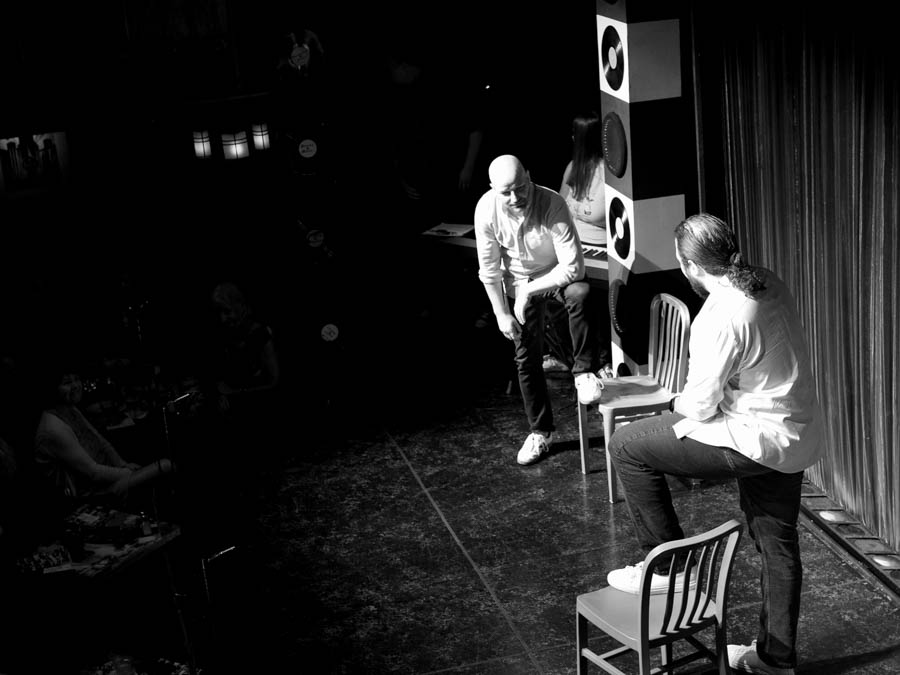
After warming up the audience with a series of calls-and-responses, Will asks the audience for the suggestions that will shape our show. A profession? Pirate. A fictitious town where our tale will take place? Willowford, Delaware. And we set it all during the American Revolution.
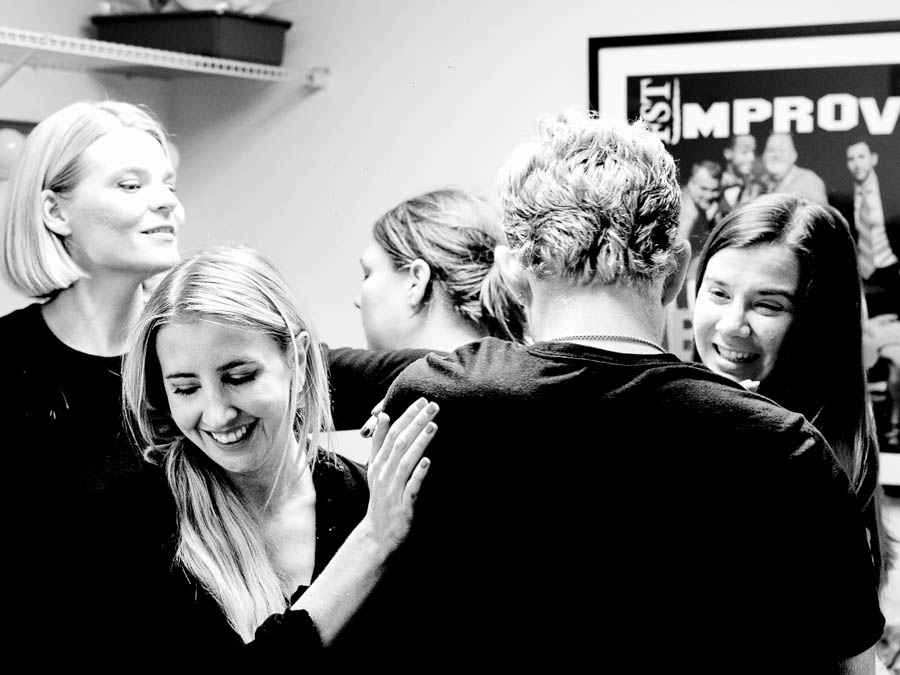
Right before I enter, I have a terrifying thought. What if I’ve forgotten how to be an improviser? Over the past 20 years, I’ve performed in hundreds of these shows, in front of thousands of people, and never once have I actually forgotten. Yet, I have this feeling every. Single. Time. There’s something about the lights, the anticipation, the inexplicable energy that is passed from performer to audience and back. It is in this sublime moment of self-doubt that I feel a connection with the history and tradition of live theater — a kinship with the artists and artisans who have helped it persist for centuries.
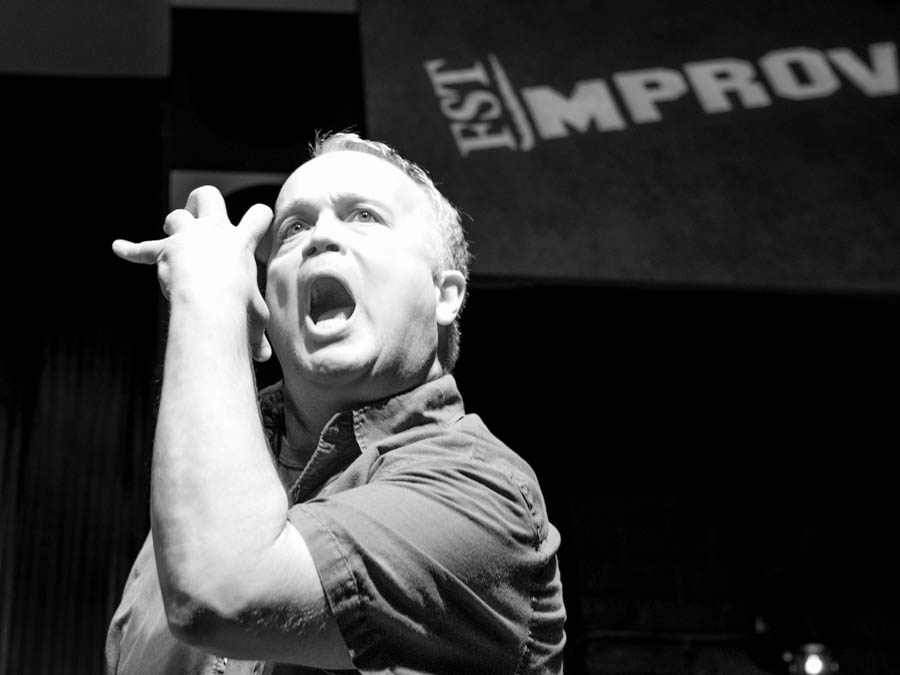
There are many types of improv comedy, but the genre is typically split into two categories: short form and long form. Short form improv mirrors what you would see on the long-running TV show Whose Line Is It Anyway? with structured theater games and premises for short scenes. Long form improv, however, can follow a narrative structure or it can be a series of related scenes that tie together thematically. Or it can be pretty much anything the players make it.
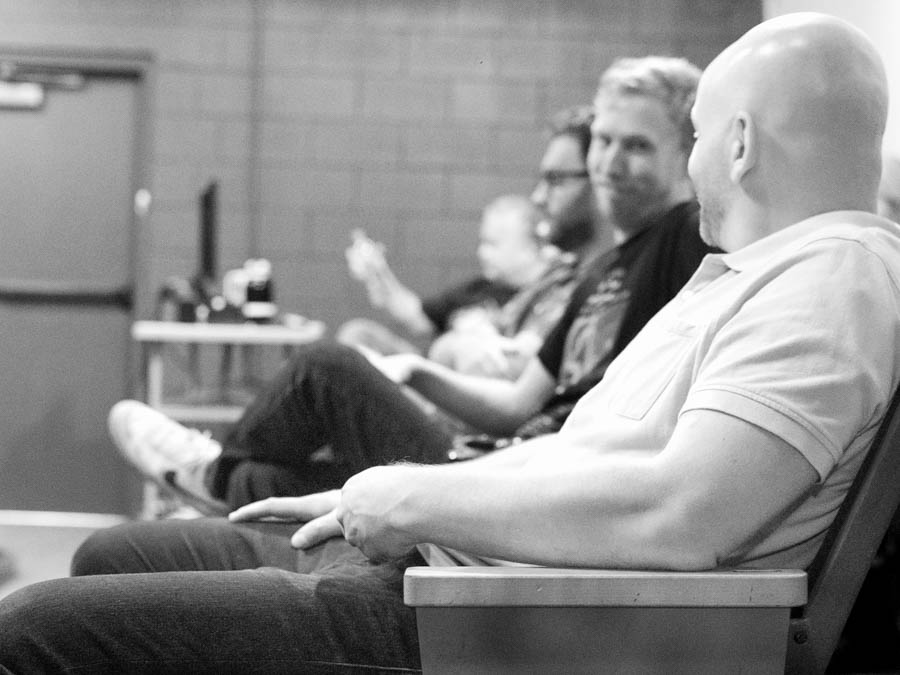
At FST, we perform a mix of both, but tonight it’s narrative long form. That means we’ll create an entire play complete with exposition, conflict, rising action, climax, falling action, and resolution. Plus, it’s a musical. Every word we say, every twist and turn, and yes, every single note of every song is created on the spot. The ensemble serves as collective playwright, composer and lyricist at once. (Even as I type this, the show in the rearview, it sounds terrifying.) When it works, it’s magic. When it doesn’t. . . well, let’s just say as improvisers we really hope it works.
The core tenant of improvisation is the notion of “Yes, and …”. It is the idea that whatever premise you create or idea you proffer — no matter how weird, wild or outlandish — I will accept its reality (yes!) and add to it (and!). In turn, I trust my fellow player to do the same (I’ve got your back!). For instance, if you enter and cast yourself as a daffodil who is sad because they’re losing their petals, you better believe I will come in as a fellow daffodil with a list of petal-loss remedies (Propecia for perennials?).
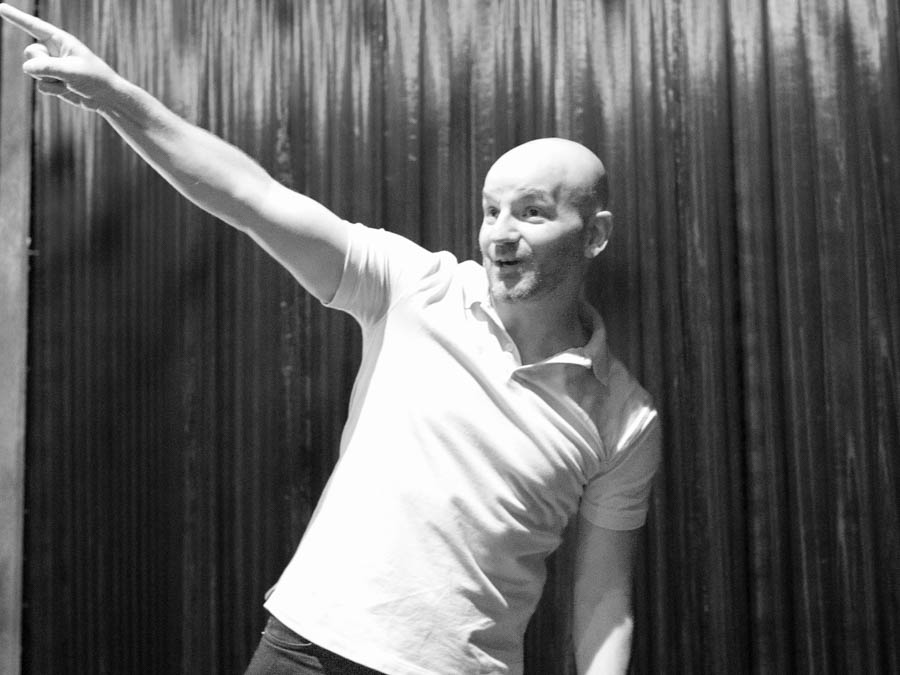
People are often surprised when I tell them that, as improvisers, we rehearse. In fact, we often rehearse in the hours just before our Saturday night show. During this particular week’s rehearsal, a local beatboxer and freestyle rapper, Karim Manning, joined us to help teach a new skill that we could add to our improviser tool belts. We’re stretched outside our comfort zones, which is saying a lot for a group of guileless improvisers.
The positive vibes and energy created in rehearsal carry over to showtime and are palpable as we’re set to take the stage. Lights dim and a mental switch flips. Instinct kicks in, and the opening group number — “Yo Ho!” — comes to life and ends with a raucous flourish.
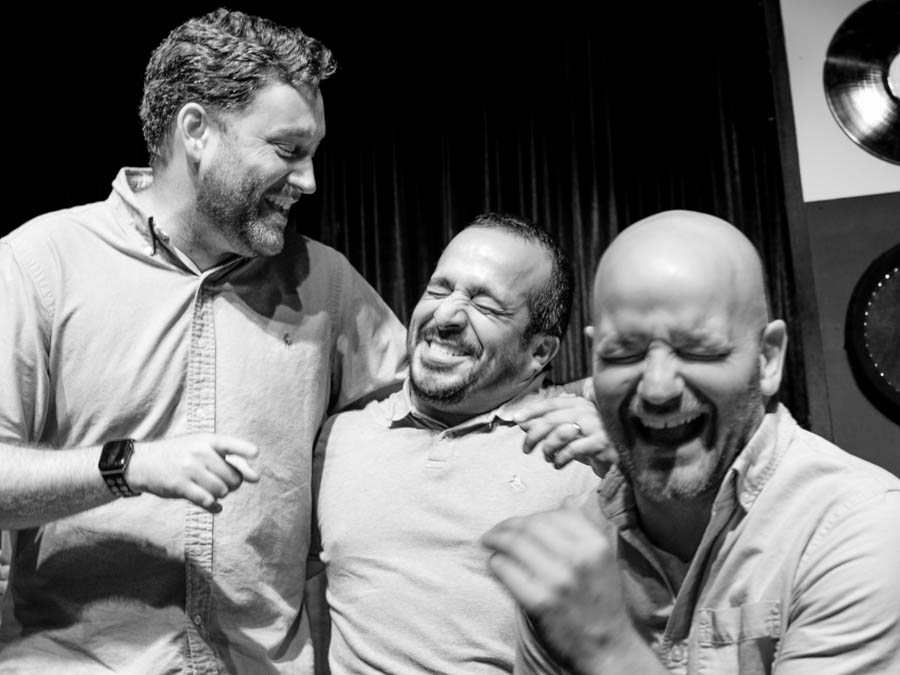
Fortunately on this night, what follows is magic.
We tell the tale of a pirate queen named Captain, who sails a ship called the Matador. As she seeks to expand her fleet to help fight for America’s independence, she falls in love with a man who cannot swim. He is given command of the Matador II anyway. They are separated. They are reunited. I play the captain’s lackey, Deck Hand Jan, who boasts flowing locks of golden hair. As an actor, my job in this show is support. Keep the plot moving forward, serve the story, find the funny, and make my fellow actors look good.
Our set ends as so many of those classic musicals do: lovers in love, subplots resolved, and all is well again in Willowford. We mingle in the lobby after with friends and audience members. A common question is heard, “How do you do that?”
It’s a skill, to be sure, but it’s more than that.
My fellow actors and I are adults who never outgrew our desire to play and be silly. We’re mad enough to stand on stage and put it on display. We’re a mix of local actors who live as far south as Port Charlotte and as far north as Tampa. Some of them trained at FST’s school, where I also serve as an occasional teacher. Others made their way through improv scenes in larger cities before finding a home here. For us, improv becomes a shared language. A common philosophy. And from that comes community. Actors in this ensemble, as with most, tend to come and go. I first performed here in the early 2000s and returned to it in 2018. Most of the faces in the cast were different, but the constant was the community. One comment I hear frequently after shows is that it seems like we really like each other. It’s because we genuinely do.
If you haven’t seen live improv comedy, or if you’ve seen it elsewhere, I encourage you to come and catch us any Saturday night at Florida Studio Theatre’s Bowne’s Lab. Or better yet, step into a class. And if you like the experience, know that it’s a reflection of a community where the tenets of improvisation extend beyond the stage. In other words, we have each other’s backs.




